Meet Some of Our Academics
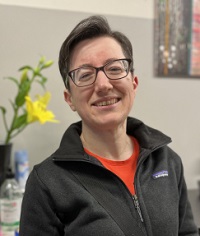
Francesca Benatti
I grew up in northern Italy, in the birthplace of British Library curator Antonio Panizzi and of Renaissance poet Ludovico Ariosto. I remember my first library card as one of the best (and most heavily used) gifts I have ever received from my parents. I confess, though, that I did not always read the "right" books, cultivating a passion for comics and fantasy besides the classics of Italian and European literature.
I like to think that I started from the oldest university in Europe, Bologna, to arrive via Ireland, at one of the youngest and most innovative, The Open University. My MA at the University of Galway introduced me to Book History, opening new ways of approaching books to ask how texts are written, published and read. My PhD added computers to the mix with Digital Humanities, the possibilities of examining texts with the help of machines, and of studying forms of writing that could not exist without computers.
Here at The Open University, I read Humanities texts in new ways with digital tools and use Humanities perspectives to question digital texts and images, as shown in my book Innovations in Digital Comics. Both of my grandmothers lived and read well into their nineties, an example that I dearly hope to follow.
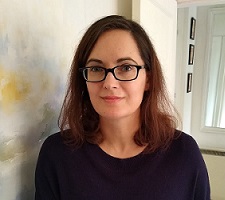
Emily Bullock
I went to six different schools before taking my GSCEs. I was used to turning up and no one would know who I was or why I was there. Fortunately, I had some supportive teachers, and always enjoyed the weekly trip to the library. My sister and I were the first in our family to stay on for post-16 education, and the first to go to university.
My research interests include short stories (and other short forms), and historical fiction. I’ve published a collection of short stories, two novels and a novella. I like to focus my writing on marginalised and under-represented voices, particularly working-class protagonists. My first novel was based on family history, my second novel was inspired by a museum exhibit, and my novella links to another work of literature; the interplay between creative writing and other works of art, and historical characters based on real-life people, are of particular interest to me.
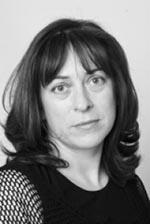
Siobhan Campbell
A poet and scholar of poetics and social practice, I am interested in how the lyric poem and the nature poem continue to have purchase. Having found my way to poetry as an antidote to polemic on a divided island, it became clear that art and imagination had potential to counter the rhetoric of power and its abuses. Having studied how the socially engaged poem can bridge divides in Northern Ireland and elsewhere, I began expanding the pedagogies of creative writing to develop frameworks which widen the remit of how writing interventions are conceived and used in pressurised environments. I’ve been privileged to work with NGOs and the UN in Iraq and Lebanon, and with military families, veterans and NHS frontline workers in the UK. My research is now adopted widely by third-sector organisations.
My current projects are two-fold: to further explore how the socially-aware poem can be capacious enough to deal with the experience of how we all live now and to establish the Expressive Creative Writing paradigm I’ve developed with new collaborators in social work and psychology.
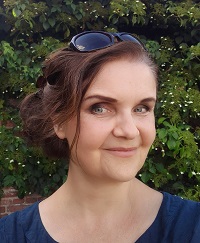
Anna Clarke
Coming to English in childhood as my third language, and eventually living across two cultures, I have long been interested in minority experiences of migration and unsurprisingly found myself ‘at home’ in postcolonial and global literatures, particularly the Indian Novel in English. As I had fallen in love with the sound of English words before I understood their meaning, and later, reading English Philology at the Jagiellonian University in Poland, was again enchanted by the sound of John Donne’s poetry read aloud, it seemed poignant, when studying for further degrees in the UK, to discover critical approaches which had a name for the experience of encountering words in texts as if they were new to us to gain new perspectives. An interest in criticism and theory, opening new ways of reading texts, looking at the world and interrogating ideas, has informed much of my teaching and research. My broader interests include Shakespearean drama and Renaissance literature, critical theory, and the nineteenth and twentieth century novel. The function of narrative fiction, especially one that crosses physical and ideological borders, continues to fascinate me in its capacity to seize the imagination, challenge ideas and open horizons.
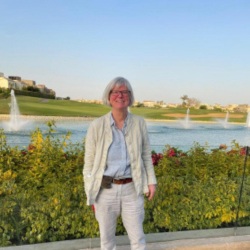
Fiona J. Doloughan
While I may not have seen it in such terms at the time, growing up in Northern Ireland during ‘The Troubles’ alerted me early on to the power of narrative/s and the complexities of cultural and linguistic formation. In this sense, it is perhaps not surprising that my research has focussed on the construction of literary narratives and the role of language/s and genre/s in shaping their reception. Nor perhaps is it surprising that I was drawn to Comparative Literature as a PhD student, since it places the study of literature in a context that reaches beyond the national.
My current research is interested in texts that unsettle ideas of what constitutes the fictional and the non-fictional in literature, and make visible the impact of borders (geographic, linguistic, generic) on the construction of identity and the articulation of voice.
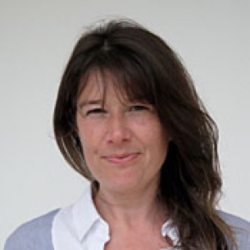
Sara Haslam
I studied first at Liverpool, drawn to the range of academic voices and the joint Literature and Language degree. I focused on literature but I’ve never forgotten my introduction to socio- and psycho-linguistics, a new way of exploring systemic inequalities.
After a PhD at King’s College London and some teaching experience I joined the OU. I was fascinated by the challenge of translating what happened in a seminar room into written materials supporting distance learning. Early on I worked as a tutor on the MA too, and my experiences there and at OU summer schools offered a wonderful induction to the OU community.
I’ve taught at every level of study during the years since. I’ve supported beginning students and PhD students, always appreciating new opportunities to collaborate with colleagues in delivering the OU’s mission.
Ford Madox Ford (1873-1939) is at the heart of my research career, since 2023 in the form of a new Complete Works. I’ve a linked focus on what I’ve called ‘literary caregiving’ 1914-18: largely volunteer efforts, largely by women, to source and distribute books to sick and wounded soldiers, aiding recovery.
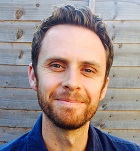
Edward Hogan
I took my first degree in English Literature and Creative Writing in the 1990s, and I was lucky to have studied such a range of writers: Geoffrey Chaucer, the Brontës, Anton Chekhov, Chinua Achebe, Toni Morrison, Raymond Chandler, Erna Brodber, Lorrie Moore, Irvine Welsh, Michael Ondaatje. After doing an MA at the University of East Anglia, I published four novels before coming to the OU for a PhD. Being a writer in academia means you make space for uncertainty, critical scrutiny, pressure, humility. I’m fortunate to be surrounded by academics in other disciplines doing fascinating things, and by students who are pushing boundaries.
I write short stories, now, a form I’ve always loved to read. The writing of short stories – the act of starting again, and often – allows me to try out various approaches and subjects. At the moment, I seem to be writing a lot about jobs and working lives. I read short fiction every day. Last week I read Flannery O'Connor and Rattawut Lapcharoensap. There’s always something to learn.
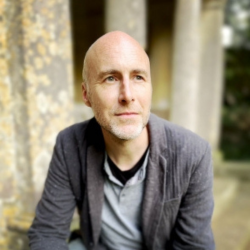
Richard Jones
You might as well put your head in a bucket for three years. That's what I was told as I set off, aged 18, to study a degree in English Literature. At the time, I was vaguely aware of an irony: this was, after all, a literary reference to an android, who, cleaning cars, offered to put its head in a bucket. Mostly, though, it raised a lot of questions. What was my relationship to this bucket? Was I on the inside or the outside? Why would anyone choose to see it this way?
As I continued my studies, I found there were people in the eighteenth century who asked similar questions. For them, literature was a way of life – a ‘ruling passion’. You could only really know the world through writing. True, some real things probably existed, but there was not much that could be said about them. They appeared in words. Or in books. Or, perhaps, in buckets. Slowly, I began to understand that the bucket – by which I mean all of literature – was the only place where something could happen at all.
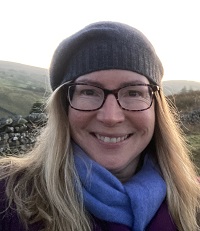
Lania Knight
When I was sixteen, I dropped out of high school and left home on a motorbike. For much of my young adult life, I felt like an outsider. I travelled around the USA, had two kids, and eventually went to university. I'd always wanted to be a writer, but my first English professor convinced me that I wasn't cut out for it, so I studied Plant Science instead. I kept writing though, and later I studied for an MA in English Literature and Creative Writing, and soon after, the PhD.
Those early experiences – leaving home at a young age, having children, studying plants instead of literature – those all influence and inform my writing even now, years later. Botany, coming of age, landscape and belonging are themes that surface in my fiction, nonfiction, drama, and poetry. Through my writing and the good fortune of having family members who identify as LGBTQA+ and neurodivergent, I see now that I have a tribe, many tribes, which happily include my own neurodivergence and non-binary ways of being.
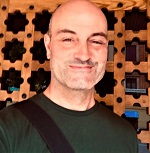
Dónall Mac Cathmhaoill
I took my first degree in English at King’s College in London. I was active in the drama society, and shortly after graduating I started working as a director of youth and community theatre. It is a strand of work that still interests me. Over the last 25 years I have worked on many different applied theatre projects: with communities in the Irish conflict, with prisoners, with marginalised young people in west London, with Traveller women, migrants and refugees, with LGBTQ+ groups, at-risk young people, people living with HIV, and even County Tyrone farmers. My first professional writing commission came through a BBC screenwriting competition, and I have been working as a writer of drama for stage and screen since then. My PhD explored the politics of authorship in dramatic writing, and it is at the intersection of these two areas, politics and performance, that my research and creative interests still lie.
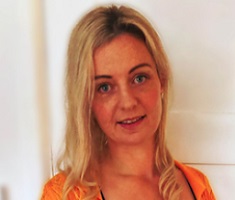
Bethan Michael-Fox
When my maternal grandmother died, my mother sent me a thick envelope in the post full of family newsletters, stories and cards I’d sent my granny as a child. It was poignant and fun to read them and I realised I’d been writing in all sorts of genres since childhood. As a teenager I became an avid diary writer. As a reader, I read so many books that were way too grown up in hindsight – as the youngest of five there wasn’t much time for my parents to check the age appropriateness of the novels I was consuming! I studied English at Cardiff University and enjoyed travelling the world through books, whilst my sisters travelled the world in reality. I was always a bit more anxious than them, but I’ve developed my confidence over the years – funnily enough through more reading, as self-help is one of my favourite genres now. I write and have published fiction, poetry, and lots of academic writing, all focused on representations and experience: representations of death and dying in literature, film and television, and increasingly representations of universities and their students and staff. Writing is how I process my experiences, and I thoroughly recommend it as a form of self-care.
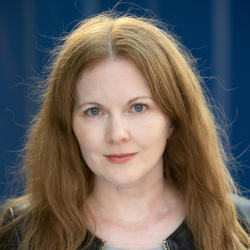
Wanda O’Connor
Originally from New Brunswick, Canada, the ancient pull of Bay of Fundy tides has always ticked into my poetry in one way or another. My research into open-form poetry (initially based on the theories of Charles Olson’s Projective Verse) continues to inform my creative practice, as do the classical subjects I explored in my first degree in Classical Languages and Literatures. My doctoral study in Critical and Creative Writing brought me to Wales, where I continue to comb the landscape for new juxtapositions in writing. Interdisciplinary relationships are central to my research, including poetry, philosophy and classical subjects, as well as the relationship between women’s poetry and feminist practice.
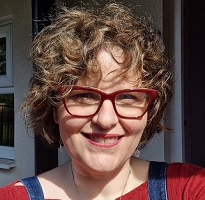
Jennie Owen
My obsession with books began in childhood, when I discovered that writers such as C.S. Lewis and Roald Dahl could spirit me away from grey school days. I was lucky that my parents encouraged me to study what I enjoyed – so in many ways it was a given that I would follow these passions. I struggled with my A Levels but went on to study my first degree in English Literature and Art in the 1990’s, with a large emphasis on creative writing. I couldn’t believe my luck at being able to write as part of my studies!
I went on to complete an MA in Writing Studies and an MA in English (the latter with the Open University). I am currently reading for my PhD in Creative Writing with Manchester Metropolitan University. As an adult I discovered I was severely dyslexic, which made a lot of sense looking back over some of the bumps in my earlier academic journey. I have learned to view my neurodiversity as a gift, allowing me to see and explore the world in a different way. I am primarily a poet, but also write and publish short fiction. My areas of interest and research include the gothic, ekphrasis, place writing, and traumascapes.
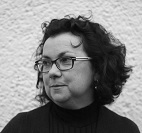
Joanne Reardon
I studied English, Classical Studies and French for my first degree and then took an MBA which introduced me to a career in marketing and PR a challenging world which provided a solid grounding for the world of academia! I came to the study of creative writing later in life after working in theatre and broadcasting for many years, my professional experience very much underpinning my teaching. I’ve always read anything I could get my hands on, snatching time to write wherever I could – my first radio play was written after work in an office with a wonderful view over London’s Southbank and the Thames, when everyone else had left for the evening. I encourage students to focus on reading as widely as they can and on writing what they know, and in my own fiction I’m inspired by characters who emerge out of distinctive landscapes. I live on the Northwest coast around Merseyside where the sea is always nudging the edges of my writing. It provided inspiration for my first novel, The Weight of Bones, a crime novel set on the Sefton coast and just like that view over the Thames all those years ago, where the river became the inspiration for the play, landscapes and the people who inhabit them are always where I find my stories.
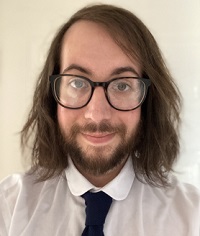
George Sandifer-Smith
I grew up in Pembrokeshire, South-West Wales, writing lyrics in a punk band, as well as stories for my own enjoyment. By the time I'd set off to Aberystwyth for university I'd moved from lyrics to poetry (my love for stories remained as the bass guitar gathered dust), via poets like Patrick Jones, Katherine Stansfield, and Carol Ann Duffy.
My research interests are writing poetry through mass global events (following the publication of a book of poems, Empty Trains, rooted in the Covid-19 pandemic) and fiction and poetry engaging in nostalgia and the act of recollection – does the memory cheat? My PhD thesis was a novel following a family across one hundred years in Pembrokeshire with aspects of magical realism (enabling the nostalgic elements to ‘come alive’), accompanied by a critical commentary on temporality and the structure of the novel.
Writing to collaborate with others is a rewarding interest I've been working on for the last few years – I've written poems to a brief for anthologies about Pembrokeshire, video games, and Anne Shakespeare, as well as fiction engaging with green hydrogen engineers and the age of misinformation.
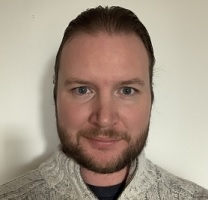
Samuel Sargeant
From a young age I was heavily informed by the books I read, and my first forays into writing were Star Wars fan fiction. Thankfully this has not survived, but I remain ‘unapologetically genre’ in my tastes and I love science fiction, fantasy, and historical novels. I took this passion for reading and writing and became the first person within my family to attend university.
I undertook several degrees in English literature, Creative Writing, and Medieval and Renaissance Studies – where I was fatefully introduced to Old-Norse Icelandic literature and language. Have you ever taken up something on a whim and fallen in love with it? This was just such an occasion: I was completely enamored by the Old Norse sagas and the historiographies of the medieval north. I now spend my time researching the form and structure of the Icelandic sagas. I was struck by the rich literary history and complex culture of medieval Iceland and wanted to draw wider attention to them. I use what I learn to write my historical fiction thriller series set in Iceland, which begins with Faith of their Fathers, through Neem Tree Press.
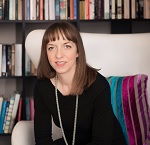
Emma Claire Sweeney
I grew up in Birkenhead in the 1980s, the eldest of three girls. One of my sisters is autistic, and has cerebral palsy, epilepsy and learning disabilities. When the doctor communicated his diagnosis, he advised my parents to place her in an institution and forget about her. I am so grateful that they ignored this advice. My sister looks at the world from such a distinctive vantage point that it is difficult to prise her apparent disabilities from her enchanting abilities. She has taught me to appreciate ways of being that too rarely achieve societal recognition, something that has fed into my commitment to inclusivity – a value so core to the OU’s mission.
All my publications – whether poetry collections, novels or literary biography – bear the stamp of my sister’s influence. Her access to language may be limited, but her way with words is idiosyncratic and inventive. This has informed my interest in innovative and collaborative approaches to the literary representation of marginalised lives, whether historical or fictional, and it has shaped my experimental approach to voice, genre and narrative.
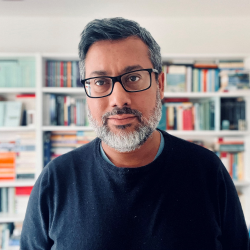
Shafquat Towheed
Perhaps it was because I moved a lot as a child – I had lived in three different countries by the time I was 11 – that whenever I moved, I had to organise my books on their shelves in the same familiar way, in order to feel at home. It was perhaps inevitable that I would become a historian of reading. After studying at the universities of London and Cambridge, I came to the Open University where I’ve run multiple research projects on reading, founded the History of Books and Reading research group, and published extensively on the subject. I’m very interested in all those questions around reading: not just why people read, but how, when, where, whether alone or in company, but most importantly, I’m interested in people’s responses to their reading. I’m also fascinated by the cultures (both material and digital) around reading, so given a chance, I’ll probably want to look at your bookshelves. As well as my interest in the history of books and reading, I also work on some well-known late 19th and early 20th century British and American writers, such as Edith Wharton and Vernon Lee.
Request your prospectus
![]()
Explore our qualifications and courses by requesting one of our prospectuses today.


